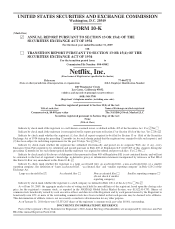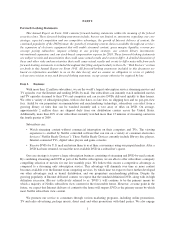NetFlix 2009 Annual Report Download - page 15
Download and view the complete annual report
Please find page 15 of the 2009 NetFlix annual report below. You can navigate through the pages in the report by either clicking on the pages listed below, or by using the keyword search tool below to find specific information within the annual report.If we are unable to compete effectively, our business will be adversely affected.
The market for in-home entertainment video is intensely competitive and subject to rapid change. New
technologies for delivery of in-home entertainment video, such as VOD and Internet delivery of content, continue
to receive considerable media and investor attention. Many of our competitors have longer operating histories,
larger customer bases, greater brand recognition and significantly greater financial, marketing and other
resources than we do. If we are unable to successfully or profitably compete with current and new competitors,
programs and technologies, our business will be adversely affected, and we may not be able to increase or
maintain market share, revenues or profitability.
Some of our competitors have adopted, and may continue to adopt, aggressive pricing policies and devote
substantially more resources to marketing and Web site and systems development than we do. There can be no
assurance that we will be able to compete effectively against current or new competitors at our existing pricing
levels or at even lower price points in the future. Furthermore, we may need to adjust the level of service
provided to our subscribers and/or incur significantly higher marketing expenditures than we currently anticipate.
As a result of increased competition, we may see a reduction in operating margins and market share.
If VOD or other technologies are more widely adopted and supported as a method of content delivery, our
business could be adversely affected.
Some digital cable providers and Internet content providers have implemented technology referred to as
VOD. This technology transmits movies and other entertainment content on demand with interactive capabilities
such as start, stop and rewind. In addition, other technologies have been developed that allow alternative means
for consumers to receive and watch movies or other entertainment, particularly over the Internet and on devices
such as cell phones. Although we are providing our own Internet-based delivery of content, allowing our
subscribers to stream certain movies and TV episodes, VOD or other technologies may become more affordable
and viable alternative methods of content delivery that are widely supported by studios and distributors and
adopted by consumers. If this happens more quickly than we anticipate or more quickly than our own Internet
delivery offerings, or if other providers are better able to meet studio and consumer needs and expectations, our
business could be adversely affected.
If the popularity of the DVD format decreases, our business could be adversely affected.
While the growth of DVD sales has slowed, we believe that the DVD will be a valuable long-term consumer
proposition and studio profit center. However, if DVD sales were to decrease, because of a shift away from
movie watching or because new or existing technologies were to become more popular at the expense of DVD
enjoyment, studios and retailers may reduce their support of the DVD format. Our subscriber growth will be
substantially influenced by the continued popularity of the DVD format, and if such popularity wanes, our
subscriber growth may also slow.
If U.S. Copyright law were altered to amend or eliminate the First Sale Doctrine or if studios were to
release or distribute titles on DVD in a manner that attempts to circumvent or limit the affects of the First
Sale Doctrine, our business could be adversely affected.
Under U.S. Copyright Law, once a copyright owner sells a copy of his work, the copyright owner
relinquishes all further rights to sell or otherwise dispose of that copy. While the copyright owner retains the
underlying copyright to the expression fixed in the work, the copyright owner gives up his ability to control the
fate of the work once it had been sold. As such, once a DVD is sold into the market, those obtaining the DVD are
permitted to re-sell it, rent it or otherwise dispose of it. If Congress or the courts were to change or substantially
limit this First Sale Doctrine, our ability to obtain content and then rent it could be adversely affected. Likewise,
if studios agree to limit the sale or distribution of their content in ways that try to limit the affects of the First Sale
Doctrine, our business could be adversely affected. For example, some studios have expressed a desire to delay
the availability of new release DVDs for rental for a brief period of time following the DVDs release to the retail
9
























